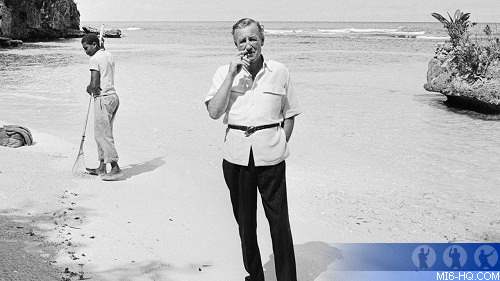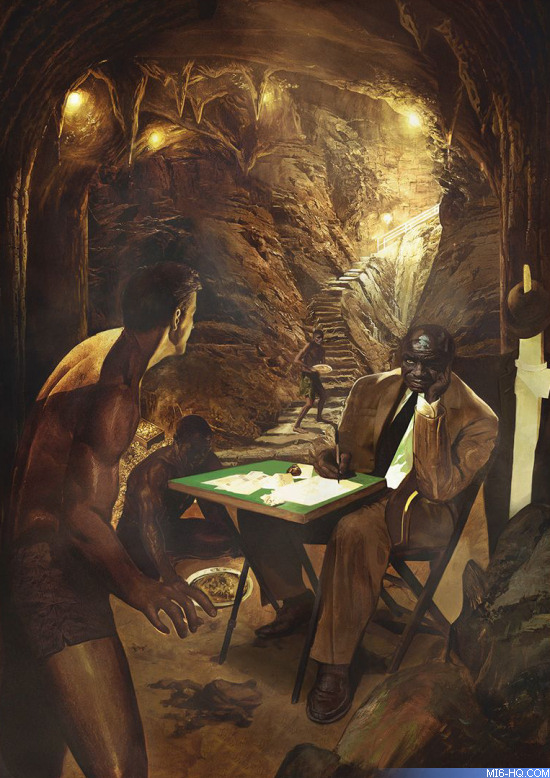Rewriting History
27th February 2023
A furore has broken out over editing Ian Fleming's novels for modern-day readers
 By MI6 Staff
By MI6 Staff
Hot on the heels of the media furore sparked by a publisher's plans to edit Roald Dahl's famous children's books to make them more culturally sensitive to modern readers, the press picked up on Ian Fleming Publication's decision to move ahead with an edited version of 'Live And Let Die'. The Fleming estate recently took back control of publishing the books themselves and, to mark the 70th anniversary of 'Casino Royale', will be re-issuing all twelve James Bond novels and two short story collections later this year.

The Telegraph ran with the headline 'James Bond books edited to remove racist references' and claimed the books would be "rewritten" to remove a number of racial references. The paper also leaked the text of the disclaimer alleged to be included at the start of each book: "This book was written at a time when terms and attitudes which might be considered offensive by modern readers were commonplace. A number of updates have been made in this edition while keeping as close as possible to the original text and the period in which it is set."
The “n-----” word, which Fleming used to refer to black people when he was writing, has been almost entirely expunged from the revised texts. This has been replaced by “black person” or “black man”, but racial descriptors are entirely dropped in some instances.
Chapter 5's title in 'Live And Let Die' was originally 'N----- Heaven,' but this was changed to 'Seventh Avenue' for the US as far back as its initial publication. The most recent Folio Society edition still used the original title.
According to the report, "dated references to other ethnicities remain, such as Bond’s racial terms for east Asian people and the spy’s disparaging views of Oddjob, Goldfinger’s Korean henchman.
References to the 'sweet tang of rape', 'blithering women' failing to do a 'man’s work', and homosexuality being a 'stubborn disability' also remain."

It is difficult to justify the claim the books were being "re-written" when only select terms have been changed. In fact, these were previously agreed to by Ian Fleming ahead of the book's publication in the United States back in 1955. The IFP has simply applied these changes across all books, not just 'Live And Let Die'.

Following a media flurry on the matter, Ian Fleming Publications issued the following statement tonight:
In 1953 when Ian Fleming began to write his second James Bond novel, Live and Let Die, a youthful Queen Elizabeth had just ascended the throne, Winston Churchill was Prime Minister and Jamaica, where much of the plot is set, was still nine years away from gaining its independence from the British Empire. In short, the world was a very different place than it is now.
Published a year later in Britain, Fleming’s text drew little comment from his editors. Yet, ahead of publication in the US in 1955, Al Hart, editor at Fleming’s US publisher, Macmillan, suggested a number of changes to Live and Let Die. Some of these corrected minor factual errors. Others deleted or changed passages or words Hart felt were racially troubling, even then. Fleming approved all the changes and the version of Live and Let Die published in America was therefore different from the British edition, and from his letters, it seems Fleming preferred the amended US version.
In 2017, when Vintage published a hardback edition of Live and Let Die, a version of the US text was used with an introduction explaining the changes. We have retained these changes.
Last year, Fleming’s books came home. Ian Fleming Publications Ltd, the Fleming family company that owns the literary copyright in his books, announced plans to publish them under its own imprint for the first time. Our first decision was to mark the 70th anniversary of the original publication of Casino Royale, the first Bond novel, by publishing new editions of all the Bonds. Paperback editions with brand new cover designs will be available from April 13th, and eBook versions are already available.
With that decision, came a discussion. As the author’s literary estate and now publishers, what responsibility did we have, if any, to review the original texts? We consulted with a number of external parties but ultimately decided that, rather than making changes in line with their advice, it was instead most appropriate to look for guidance from the author himself. The original US version of Live and Let Die, approved and apparently favoured by Ian, had removed some racial terms which were problematic even in mid-1950s America, and would certainly be considered deeply offensive now by the vast majority of readers.
We took that as our starting point, but felt strongly that it was not our role to comb out every word or phrase that had the potential to offend. We thus decided to apply the sensibilities of the original US edition of Live and Let Die consistently, across all the texts. Some racial words likely to cause great offence now, and detract from a reader’s enjoyment, have been altered, while keeping as close as possible to the original text and the period.
The changes are very small in number. Indeed some books, including Casino Royale, remain completely unaltered. We are certain Ian Fleming would approve these edits, just as he approved the changes to the US edition of Live and Let Die, and we encourage people to read the books for themselves when the new paperbacks are published in April.
In James Bond, Ian Fleming created one of the most famous literary characters in history. His books deserve to be read and enjoyed as much now as when they were written. We believe the new Bond editions will extend their pleasure to new audiences. We are certain that is something Ian Fleming would have wanted.
Ian Fleming biographer Andrew Lycett weighed in today with an opinion piece in The Independent: "It’s never a good look to change what an author originally wrote. It smacks of censorship, and there’s seldom much mileage in that. Of course, there are words and phrases in the Bond novels which look out of place today. .. However, I feel strongly that what an author commits to paper is sacrosanct and shouldn’t be altered. It stands as evidence of that writer’s – and society’s – attitudes at a particular moment in time, whether it’s by Shakespeare, Dickens, or Ian Fleming."

Illustration ©2019 Fay Dalton from The Folio Society edition of LIVE AND LET DIE
"The only changes to the text should come from the author. So Fleming himself allowed the title of a chapter heading in Live and Let Die, published in 1954, to be altered in subsequent editions because it used an offensive racial stereotype. But there's no way Bond's character in the Fleming books can be modified to make him politically correct. Fleming created a sexist, often sadistic, killer, with anachronistic attitudes to homosexuals, and to a range of people of different nationalities. These stand as evidence of how Britons (or at least some of them) thought at a particular moment in time... There is a reason for [these changes], and its name is business. Their popularity means that they are more likely to be filmed or turned into comics, video games, or any other media which copyright holders are drawn to in the promotion of a 'franchise.'"
Lycett may have a point with a potential motivation behind such changes. Under current copyright law, Ian Fleming's works will enter the public domain after the end of 2034. Just 11 years from now, anyone will be able to publish any version of a James Bond book. There is not a lot of time left to monetize the literary 007.






